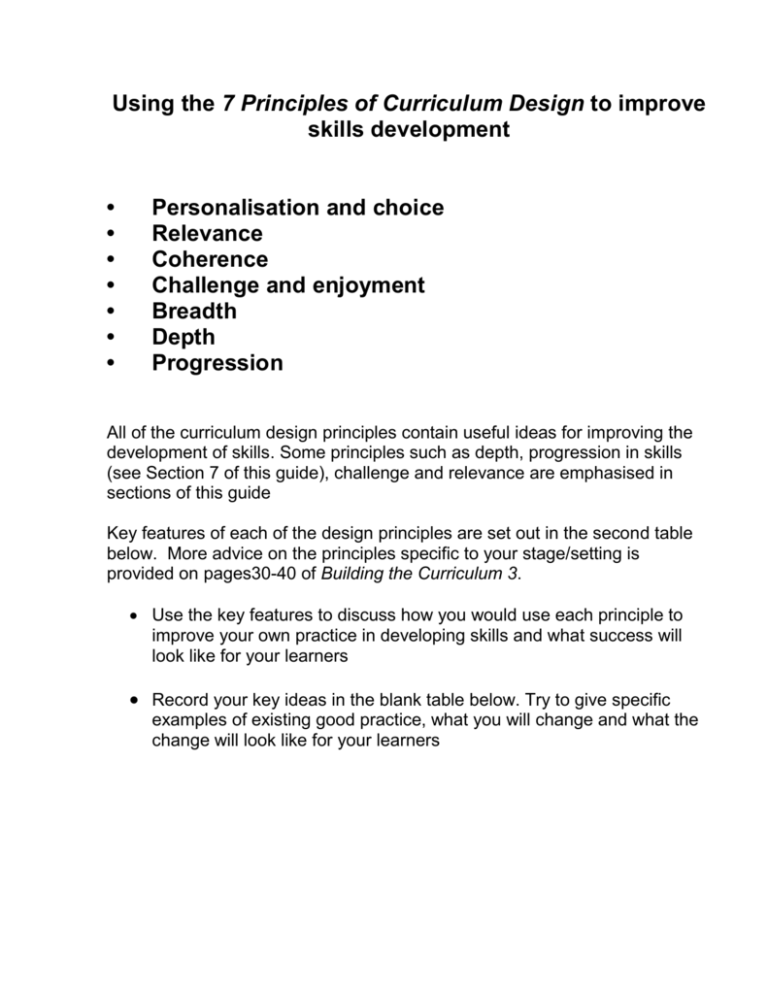The 7 Principles of Curriculum Design
advertisement

Using the 7 Principles of Curriculum Design to improve skills development • • • • • • • Personalisation and choice Relevance Coherence Challenge and enjoyment Breadth Depth Progression All of the curriculum design principles contain useful ideas for improving the development of skills. Some principles such as depth, progression in skills (see Section 7 of this guide), challenge and relevance are emphasised in sections of this guide Key features of each of the design principles are set out in the second table below. More advice on the principles specific to your stage/setting is provided on pages30-40 of Building the Curriculum 3. Use the key features to discuss how you would use each principle to improve your own practice in developing skills and what success will look like for your learners Record your key ideas in the blank table below. Try to give specific examples of existing good practice, what you will change and what the change will look like for your learners The 7 Principles of Curriculum Design Selected Design Principle ________________________ Give examples of this principle in your current practice. How could you use this principle to improve practice in developing skills? What would this improvement in practice look like for learners? The 7 Principles for Curriculum Design In our setting we can improve the way that we will support skill development for our learners by ……… Personalisation & Choice Some starters to consider how you could improve the development of learners’ skills focusing on personalisation and choice: Dialogue focused around the skills learners use in their wider lives Making reference to learners skills and interests during day to day dialogue Using knowledge of how they learn in different ways Dialogue focused on assessing their understanding and providing feedback on their next steps and progress Listening to learners questions and ideas Providing support tailored to their differing needs Coherence Some starters to consider how you could improve the development of learners’ skills using coherence: Making clear links between the skills used within and across curriculum areas and in interdisciplinary studies Highlighting the similarities and differences between different skills and the use of a skill in different contexts Promoting a shared understanding of skills and involving learners in understanding and reflecting on their own development of skills Relevance Some starters to consider how you could improve the development of learners’ skills in relation to relevance: Selecting contexts for skills which relate to the learners’ experience, needs and interests in and beyond school Emphasising skills for learning, life and work, making connections with the use of skills in learning, in the home, in the local community, the world of work, travel or interests in leisure, sport or the media. Challenge & Enjoyment Challenging our learners to think hard and develop their skills to the full Thinking about what is needed to take learners to the next stage in developing and applying skills Breadth Progression Using the full breadth of skills in the experiences and outcomes Making better links with skills in literacy, numeracy and heath and wellbeing Being aware of prior learning in skills Moving learners through challenging activities to new learning or consolidating skills by practice Giving more emphasis to skills that are transferable across curriculum areas Providing opportunities for application of skills in new contexts Developing secure learning of subject-specific skills Encouraging learners to reflect on their own learning and how secure their learning is Depth Increasing the depth of learning of skills by going beyond acquiring knowledge to emphasise learners’ understanding Encouraging learners to show their understanding in different ways so that we are more aware of their understanding/ misunderstanding Emphasising the application of skills in different contexts.







